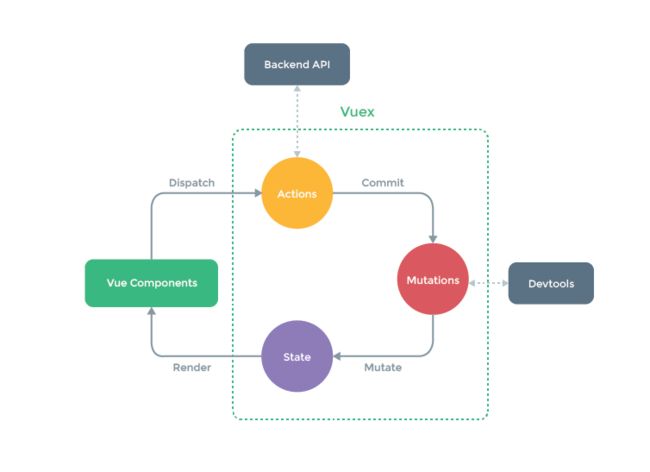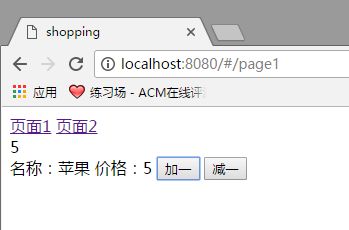Vuex 是一个专为 Vue.js 应用程序开发的状态管理模式。
vue组件通过dispatch方法触发Actions动作,然后Actions通过commit方法来触发Mutations,Mutations通过mutate方法来更改State状态,然后State状态再用render方法渲染到组件上。
Actions执行异步操作(比如后台调用API),Mutations执行同步操作。
1. Vuex的安装
通过package.json将Vuex引入,通过 npm install安装。
2. Vuex的实例
2.1 项目引入Vuex
在main.js文件中引入Vuex,然后调用use方法使用,接着实例化一个store,将Vuex.Store传入store中,各种参数就在store中写。
import Vuex from 'vuex'
Vue.use(Vuex)
let store = new Vuex.Store({
})
2.2 Vuex的实现
demo实现效果:父组件中定义一个总数totalPrice,在子组件(page1)通过加减两个按钮,能对父组件的totalPrice实现增加,减少操作。(page1加减按钮一次操作数值为5)
在App.vue中
我们定义totalPrice 计算属性在页面显示,totalPrice的值通过Vuex下的store.getters中的getTotal计算出来。
{{totalPrice}}
export default {
computed: {
totalPrice () {
return this.$store.getters.getTotal
}
}
在page1子组件中
定义addOne和minusOne方法,用两个按钮承载。按下按钮会通过dispatch方法为increase,decrease这两个actions动作传入data中的price(即this.price)
{{'名称:' + name}}
{{'价格:' + price}}
export default{
data () {
return {
name: '苹果',
price: 5
}
},
methods: {
addOne () {
this.$store.dispatch('increase', this.price)
},
minusOne () {
this.$store.dispatch('decrease', this.price)
}
}
}
在main.js中
①我们通过state来定义totalPrice这个变量。
②this.price传入actions中的increase和decrease后,actions 函数传入了context和price两个参数,price来接收this.price, 而context 对象与 store 实例具有相同方法和属性的,因此我们可以调用 context.commit 提交一个 mutation,把price提交过去。
③更改 Vuex 的 store 中的状态的唯一方法是提交 mutation。我们也设置两个参数,第一个参数就是状态state,第二个参数就是price,我们通过price来接收commit过来的price,传入state是为了使用state.totalPrice这个回调函数,来对state下的totalPrice进行操作。
④我们在getters中定义getTotal这个方法,传入state,返回state.totalPrice,返回的值能被App.vue中的totalPrice直接调用。
let store = new Vuex.Store({
state: {
totalPrice: 0
},
getters: {
getTotal (state) {
return state.totalPrice
}
},
mutations: {
increment (state, price) {
state.totalPrice += price
},
decrement (state, price) {
state.totalPrice -= price
}
},
actions: {
increase (context, price) {
context.commit('increment', price)
},
decrease (context, price) {
context.commit('decrement', price)
},
}
})
把store放在这里,全局使用(跟vue-router一样)
const app = new Vue({
el: '#app',
store,
render: h => h(App)
})
这样我们就完成了Vuex的整个生命周期。


